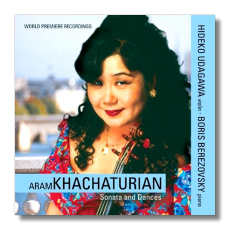
The Internet's Premier Classical Music Source
Related Links
- Khachaturian Reviews
- Latest Reviews
- More Reviews
-
By Composer
-
Collections
DVD & Blu-ray
Books
Concert Reviews
Articles/Interviews
Software
Audio
Search Amazon
Recommended Links
Site News
 CD Review
CD Review
Aram Khachaturian

Sonatas & Dances
- Violin Sonata
- Elegy
- Dance
- Song-Poem
- Dance #1
- Gayaneh:
- Lullaby
- Nuneh Variation
- Ayesha's Dance
- Sabre Dance
- Masquerade: Nocturne
- Spartacus:
- Dance of Egyna
- Grande Adagio
Hideko Udagawa, violin
Boris Berezovsky, piano
Koch International Classics 3-7571-2 DDD 58:21
This disc includes several first recordings. Prominent among these is the Violin Sonata, written in 1932. Unfortunately, Daniel Felsenfeld's uninformative notes tell us next to nothing about it, except for the fact that it is an early work – something we could have deduced from the year of composition alone. It is clear that the composer was influenced by the folk music of his native Armenia in this sonata, in which a shorter, soulful opening movement precedes a much longer and more kinetic second movement. It is a nice but not critical addition to the Khachaturian discography.
The Dance, Song-Poem, Elegy, and Dance #1 are even earlier works, written when the twenty-something year-old composer was a student of Mikhail Gnessin at the Moscow Conservatory. The Elegy (in a transcription by one V. Mikhailovsky) and the Dance #1 have not been recorded before either. These short works are even more explicitly influenced by Armenian culture.
The remaining works on this CD are taken from Khachaturian's ballets; the arrangements are by Mikhailovsky, L. Feigin, K. Mostras, Jascha Heifetz, and the composer himself. Most of this music is very familiar – who doesn't know the "Sabre Dance"? - but some of these arrangements are appearing on CD for the first time as well.
Hideko Udagawa studied with Nathan Milstein, but she sounds nothing like him, at least in this repertoire, which admittedly does not call for crystalline tone and a holier-than-thou style. Her playing is colorful, communicative, and full of character, but somewhat lacking in variety and in the last degree of whatever the Armenians call "schmaltz." Berezovsky is a forthright partner, very much to the manner born. The engineering is intimate and true.
If you pop this CD into the CD-ROM of your PC, you'll access several other features, most notably a "music video" of the performers playing the "Sabre Dance." As far as music videos go, this is pretty unimaginative stuff – the pianist doesn't get seen at all – but it does add to this release's modest attractions. Oh well. Given the recent upsurge in interest in the culture of Armenia (Atom Egoyan's Ararat, the Arshile Gorky exhibitions, etc.) the timing of this CD is good.
Copyright © 2003, Raymond Tuttle


















